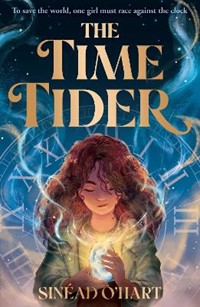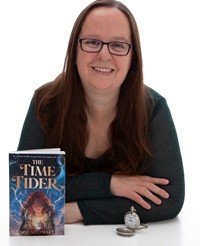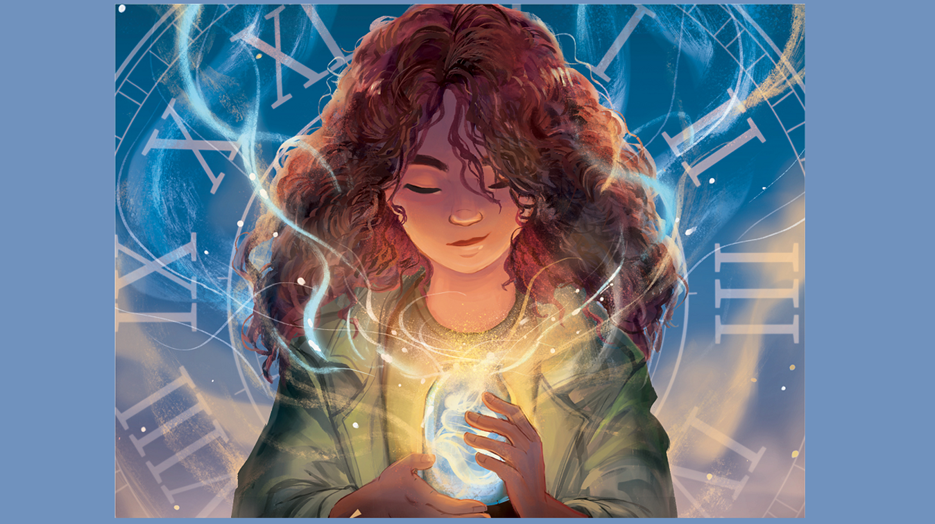Sinéad O'Hart


About Author
Sinéad O'Hart was raised in a small house full of books in the south-east of Ireland. She has a degree in Medieval English and has had many careers (including butcher, bookseller and university lecturer). She now lives in County Meath, near Dublin, with her husband, their daughter and an ever-expanding book collection. Visit sjohart.wordpress.com | Twitter @SJOHart
Interview
The Time Tider (Little Tiger Press)
February 2023
Sinéad O'Hart explores time travel in her gripping new adventure, The Time Tider. What would happen if there was 'left over' time whenever someone died before their time? What dangers would this unused time pose? And who would sort out the problems it created?
In this Q&A, ReadingZone asked Sinéad O'Hart what inspired her new time-based adventure and about the challenges are in writing a time travel adventure, as well as exploring how she gets to know her characters and how her settings develop.
Read a Chapter from The Time Tider
Q&A with Sinéad O'Hart
1. How did you get started in writing books for children and young people?
I've wanted to write all my life, and whenever I tried to write I always came out with stories for children - that's just how my brain works, I think! I love stories about friendship, adventure, high emotional stakes, saving the world (a lot), science-fiction, fantasy, humour, amazing creatures and mythological beasts, and so much more, so when it comes to reading (and writing) stories, it's usually children's books for me.
I first decided to give writing a proper go, as a career, back in 2012; I gave up a job, with my husband's support, and chased the dream. Two years later I had my agent - Polly Nolan, who still represents me now - and my first book deal for my debut novel, The Eye of the North. It hasn't always been plain sailing, and it has involved a lot of skating close to the edge of my bank balance, but it has been more than worth it.
2. Can you tell us about your new book, The Time Tider?
The Time Tider is the story of Mara, a 12-year-old girl who lives with her dad, Gabriel, in the back of a van. They have a nomadic life - always on the move, running from shadowy figures who, Gabriel fears, are pursuing them - and Mara has no chance to go to school, make friends, or have a life. Gabriel has a job, of sorts, which Mara thinks has to be something illegal - he never tells her anything about it, or lets her see him at work. Eventually, she decides to find answers to her questions, and she discovers that her dad is the Time Tider, a person whose task it is to dart back through history using a technique called the Stitch, to collect lost or wasted or unused Time before it can form anomalies called Warps, which threaten the stability of time for everyone else. Before she can ask her dad about this, he is kidnapped. Mara and her newfound friend Jan have to find out who kidnapped him, and how to get him back, before the fabric of Time itself is put under threat.
3. What sparked the first ideas for this book and how did the novel evolve?
This book first popped into my head over 20 years ago, when I was preparing to begin a PhD in medieval English literature. I was reading a history book which talked about how concepts of time, and how we measure time, began to change in the Middle Ages with the advent of mechanized clocks and timekeeping, and an idea zapped me between the eyes: what if this change in how we measured time meant that a Warp - an anomaly in the flow of Time - opened up, and into it poured all the wasted Time, the unused Time, the lost Time, Time left over after people die without having lived out their full lives? If that did happen, what would it mean? What could you do with all that time? What effect would it have on the rest of the world?
I wrote down as much of the idea as I could, on the scrap of paper I had available, and so began a two-decade-long struggle to get the idea into book form. No matter what approach I tried, or what setting I put the tale in, it never seemed to work, and I'd finally decided: this story landed in my head by mistake, and I'm not actually the person meant to write it… and then, a contemporary setting appeared in my imagination, and away I went. This is my fifth attempt to write this story, and I'm so glad it's finally out of my head (it's been prodding me in the cerebellum for years!)

4. Once you started writing it, what were the challenges?
Mostly, the challenges were based around the novel's contemporary setting, which I'd never tried to do before. I found that tough, as the world of the book has to be 'real', and familiar, and something that a child reader would look at as being recognisable and true. In my previous books, I could use some basic historical facts to underpin a largely made-up fantasy world, but in this one, I had to base most of it in reality (besides the timey-wimey bits, of course).
And then, the other major challenge was the time aspect. I'd never tried to write a book that even came close to having anything to do with time travel - and The Time Tider doesn't feature time-travel in the expected way, which is a deliberate choice - because I knew that as soon as I started to think about the complexities of time-travel, my brain would turn itself inside-out. No book about time-travel ever 'works', truly, on a scientific or philosophical level - there are always loopholes, or contradictions, or things a reader can pick apart, and I'm sure there are plenty of them in my book, too! But I wanted to write a story about travelling through Time which wasn't what readers might expect, and one which might avoid some of the common paradoxes and problems of time-travel writing, and I think - I hope! - I mostly pulled it off.
5. How did you plan the technical side of capturing 'lost time' - something that sounds amazing but comes with many challenges.
I'm not sure I planned it, really. I sort of threw myself into the problems of the plot and tried to struggle my way back out again, which was a long, laborious, and (I'm sure) terribly inefficient way of doing things, involving a lot of writing and rewriting and painful editorial letters. Sometimes, a concept which seems clear in your head can be extremely hard to put across on paper, and I'm very glad of my editors' gentle and persistent questions, their attempts to get me to see that, just because I had a handle on an idea, that my readers couldn't be expected to follow my logic if it wasn't on the page.
One of my editors came up with the idea of using extracts from The Time Tider's Handbook as chapter headings, which I found immensely helpful - they not only helped to structure the book, hinting at the action to come in the chapter, but also to give some of the background information which the reader might need, helping me to build the mythology and the ideas about Time without having to go into too much detail in the novel itself. (Editors are the best.)
6. How did you develop the relationship between Mara and her dad, particularly with all his secrets?
This is a tricky one! I didn't have any personal experience to draw on, as my childhood was vastly different from Mara's, but I think it's about knowing your characters, and knowing what drives them and what they want. If you know them from the inside out, then it's easy to put yourself behind their eyes and imagine what they'd see, or feel, or do, in any situation.
It's important to keep yourself out of the person you've created, besides to add basic, general, human things like love for your family and a desire to survive; when your character is reacting or acting, it has to be true to them, and what they'd do - not what you, the author, would do. So, that's something that comes with drafting. It's like creating a sculpture by carving away everything that isn't part of the art you want to create - when you're writing a character, each draft helps you to peel away another layer of what isn't true to them, until eventually you have a character who feels three-dimensional and real, but has a logical, understandable, complex, and true set of reasons for doing what they do and acting how they act.
When it came to Mara's dad, I put myself in his shoes. I imagined the things he's facing, the challenges he's dealing with, the things he wants, and I built him from there. With Mara, I did just the same, and the clashes between them became clear. There's a lot of love between these characters, but lots of complication getting in the way.
7. How does Mara develop through the book?
Mara is a character I love, and I think that's because she has always had one thing, throughout all the versions of her that have existed in my head through the years. That thing is a solid core, an absolutely unshakeable desire to do what's right - something she might get, arguably, from her mother.
In all the previous drafts of this story, Mara's determination to see things done fairly, without exploitation, despite the personal cost to her and her family, is something I really admire and can only hope to emulate. She's not perfect: she's bristly, and hot-headed, and impatient, and can sometimes jump into things before she's fully thought them through, and she's not an easy person to befriend, but she has a quiet confidence that I really like.
I love writing girl characters who are so different from how I was as a child - not in terms of their moral compass, maybe, but in terms of their courage and determination. In earlier drafts she was a bit more timid and a bit less self-assured, someone who might cry more easily than the Mara who ended up in the finished book, perhaps, but as I wrote and rewrote her, I got to know her better. I think I've ended up with the Mara that this book deserves.
8. Did any of the supporting characters surprise you?
I think Jan, Mara's friend, is a bit funnier than I expected him to be! I've always loved Jan, too, though his family name has changed since I first began to write this story. The first version was a straightforward epic fantasy, so Jan had a fantasy surname. I love the backstory I've created for him, here.
The central driving force behind Jan's desire to come on Mara's adventure (no spoilers!) has never changed, either - he always had that impetus, even when he was an entirely different character, and in one version of the story he was even a sort-of baddie! But I love how he's developed here, and how endearing he is.
I was also surprised by the character of Ingrid Maxwell, who only began to come into her own in later drafts; she was always a bit of a background character, until her true significance leapt out of the page at me. Ingrid wanted to stand her ground, and I'm glad I gave her that space.
9. There is a lot of local travel in the book - did you 'map out' the adventure before writing it? Do you prefer to base your books on places you know?
This is the first time I've written a story that's partly set in a fictionalised version of my own home county of Wexford, in South East Ireland. It's not fully set there: the book begins in Dublin, then the characters travel through Wicklow, and then on into Wexford. The town of Whiteharbour is a fictional version of the real town of Wexford (and I think anyone who has been there would recognise it from my descriptions). Port Ross is based very loosely on the real town of New Ross, and Derrinfield is a mish-mash of lots of midlands towns near where I now live, though it's not based on anywhere in particular - and I wish we had a tram connection to Dublin city!
I am glad to have had a vague mental map of where I wanted the characters to go, and it did help me with settings and moving the plot along. In my second book, The Star-Spun Web, Dublin (and a fictionalised, overlaid version called Hurdleford) play a large role in the plot, and I did find it comforting and useful to set the story in places I knew well, and could recall at will.
10. Are you planning any more Time Tider adventures? What are you writing currently?
No more Time Tider adventures, sadly! I think the story is pretty much told, now (at least, the characters are quiet, and they're not kicking me in the brain any more). I have another book which is written and almost ready to go - but I'm not allowed to say much more than that about it, unfortunately! It's got an Irish mythology-based plot, and I really loved writing it, so I can't wait until that's out in the world. Watch this space!
....And when you're away from your desk:
What super skill would you choose - Time Travel, Invisibility - or something else?
I think I'd quite like to have the ability to know what all the other versions of myself are doing, in all the different versions of me that exist in different realities! This idea - that every decision we make causes a 'branch' in reality where one version of us goes off in one direction, and another version of us takes a different path entirely, and both 'exist' simultaneously though without knowledge of one another - is fascinating (and turns up in my book The Star-Spun Web). I'd love to peek at my other selves and see what they're up to.
Where would you spend a favourite day out?
By the sea, climbing over rocks, collecting seaweed, breathing in the salty air and letting the sound of the waves calm my heart, before retiring to somewhere warm, cosy, and quiet for good food and a good book, or a conversation with someone I love. That sounds like heaven to me.
What's your most precious possession?
A green teddy that my late grandmother, Kathleen, made for me in the last weeks of her life. She made it from old curtains, and stuffed it with rags and old, holey tights, and stitched on eyes and a nose and a mouth and buttons made of felt (which are mostly loved off, now). I've had this toy all my life, or at least all the life I can remember, as my grandmother died when I was a little over four years old, and it has come with me everywhere I've lived. I almost lost it once, during a house move, and I still shudder at how broken-hearted I would have been without it. I love it, and I hope I'll always have it.
 The Time Tider
The Time Tider
 Skyborn
Skyborn
 The Star-spun Web
The Star-spun Web
 The Eye of the North
The Eye of the North
